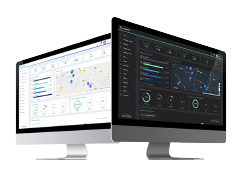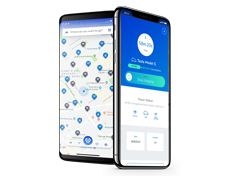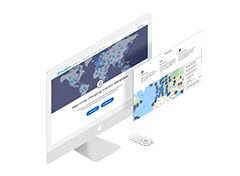
What are SDGs? 17 Sustainable Development Goals
Sustainability | Environment | Climate changeThe UN 2030 Agenda for Sustainable Development has 17 Sustainable Development Goals (SDGs) to protect our planet.
It has been five years since the approval of the 2030 Agenda for Sustainable Development by the UN, whose objectives need an urgent boost from global leaders, governments, private companies, society and people like you.
Watch out, because world figures like Shakira, UNICEF Goodwill Ambassador, asked world leaders to imagine a world where we would achieve the goals by 2030. Can you imagine it too?
SDGs are based on the results of the MDGs, the Millennium Development Goals, another 15-year plan that closed its cycle in 2015 and brought in a new cycle where the SDGs go much further: they aim to expand horizons and achieve all those goals that were not met, leaving nothing and no one behind.
¿What are the Sustainable Development Goals?
A total of 17 goals interconnected with 169 integrated and indivisible aims to ensure a better future for all, with major global challenges to combat such as poverty, inequality, peace and climate change:
Well, after this reality shock, let's see what all these goals are about in a synthetic way, emphasizing those that seem most relevant and urgent to us:
End poverty in all its forms everywhere.
More than 700 million people, or 10% of the world population, still live in extreme poverty today.
“Globally, the number of people living in extreme poverty declined from 36 per cent in 1990 to 10 per cent in 2015. But the pace of change is decelerating and the COVID-19 crisis risks reversing decades of progress in the fight against poverty”, according to UN sources.
Ending hunger, achieving food security and improved nutrition, and promoting sustainable agriculture.
Current UN estimates show that nearly 690 million people are hungry, what it means 8.9% of the world population.
According to the World Food Programme, 135 million suffer from acute hunger largely due to man-made conflicts, climate change and economic downturns. The COVID-19 pandemic could now double that number, putting an additional 130 million people at risk of suffering acute hunger by the end of 2020.
Ensure healthy lives and promote well-being for all at all ages.
“Currently, the world is facing a global health crisis unlike any other — COVID-19 is spreading human suffering, destabilizing the global economy and upending the lives of billions of people around the globe.
Health emergencies such as COVID-19 pose a global risk and have shown the critical need for preparedness. The pandemic provides a watershed moment for health emergency preparedness and for investment in critical 21st century public services”, claims the UN.
Ensure inclusive and equitable quality education and promote lifelong learning opportunities for all.
“Education enables upward socioeconomic mobility and is a key to escaping poverty. Nevertheless, about 260 million children were still out of school in 2018 — nearly one fifth of the global population in that age group. And more than half of all children and adolescents worldwide are not meeting minimum proficiency standards”, according to the UN.
Achieve gender equality and empower all women and girls.
According to the UN, 1 in 5 women and girls between the ages of 15 and 49 report experiencing physical or sexual violence by an intimate partner within a 12-month period.
This is undoubtedly a goal we must achieve as a matter of extreme urgency.
Ensure access to water and sanitation for all.
“Worldwide, one in three people do not have access to safe drinking water, two out of five people do not have a basic hand-washing facility with soap and water, and more than 673 million people still practice open defecation.
Water scarcity affects more than 40% of the global population and is projected to rise”, according to UN sources.
Ensure access to affordable, reliable, sustainable and modern energy.
Did you know that 3 billion people rely on wood, coal, charcoal or animal waste for cooking and heating?
13% of the global population still lacks access to modern electricity and energy is the main contributor to climate change, accounting for about 60% of all global greenhouse gas emissions.
Promote inclusive and sustainable economic growth, employment and decent work for all.
Build resilient infrastructure, promote sustainable industrialization and foster innovation.
Reduce inequality within and among countries.
Make cities inclusive, safe, resilient and sustainable.
Did you know that cities and metropolitan areas represent about 70% of global carbon emissions and over 60% of resource use?
The UN strongly states that rapid urbanization is resulting in a growing number of slum dwellers, inadequate and overburdened infrastructure and services, worsening air pollution and unplanned urban sprawl.
Ensure sustainable consumption and production patterns.
Each year, an estimated one third of all food produced – equivalent to 1.3 billion tonnes worth around $1 trillion – ends up rotting in the bins of consumers and retailers, or spoiling due to poor transportation and harvesting practices.
Do you remember that we are wasting the natural resources of two entire planets? We absolutely cannot continue at this crazy pace of consumerism.
Take urgent action to combat climate change and its impacts.
According to UN data, 2019 was the second warmest year on record and the end of the warmest decade (2010- 2019) ever recorded, in addition to the fact that carbon dioxide (CO2) levels and other greenhouse gases in the atmosphere rose to new records in 2019.
And if we add that sea waters have warmed up and sea levels are rising due to the melting of glaciers, which lose an average of 1.07 million km2 of sea ice every decade... We must act with extreme urgency, don't you think?
Conserve and sustainably use the oceans, seas and marine sources.
Did you know that there is a plastic island of almost 2 million km2 in the middle of the Pacific? This island is nearly three times the size of France, and joins 4 other large islands found around the world.
There are currently 150 million tons of plastic floating in our seas, rivers and oceans, according to the World Economic Forum.
The consequences of plastic pollution in the sea are enormous, and if we continue this way there might be a day when for every 3kg of fish there will be 1kg of plastic.
Sustainably manage forests, combat desertification, halt and reverse land degradation, halt biodiversity loss.
In 2016, the United Nations Environment Programme (UNEP) warned that a global increase in zoonotic epidemics was a cause for concern. In particular, it stated that 75% of all new infectious diseases in humans are zoonotic and that these diseases are closely linked to ecosystem health.
To prevent, stop and reverse the degradation of ecosystems worldwide, the United Nations has declared the Decade on Ecosystem Restoration (2021-2030), included in the 2030 Agenda for Sustainable Development.
Promote just, peaceful and inclusive societies.
The number of people fleeing war, persecution and conflict exceeded 70 million in 2018, the highest level recorded by the UN refugee agency (UNHCR) in almost 70 years.
In 2019, the United Nations tracked 357 killings and 30 enforced disappearances of human rights defenders, journalists and trade unionists in 47 countries.
Revitalize the global partnership for sustainable development.
And to ensure compliance with all the SDGs, an annual report, prepared by the UN Department of Economic and Social Affairs, makes it possible to evaluate progress and assess which area(s) need to be emphasized and/or strengthened.
Are SDGs legally binding?
Unfortunately, the answer is no, as they are not legally binding or mandatory. However, the success of the SDGs depends on the level of commitment of Member States.
The purpose of the UN is for each country to establish its own legal framework for the fulfilment of these 17 objectives, the success of which will depend on the sustainable development plans and programmes adopted in political terms by those countries.
Consequently, each country has a moral and political responsibility to take action to implement the Sustainable Development Goals, and to subsequently monitor progress at the national, regional and global levels to ensure that the goals included in the Agenda for 2030 are properly met.
However, at the last COP25 (the UN Conference on Climate Change held in December 2019), the President of the European Commission, Ursula Von der Leyen, announced the creation of the first European Climate Law. Its first draft was published in March 2020, and although it is still awaiting approval, it is expected to become a directly applicable regulation for all Member States from 2021.
The purpose of this law is clear: to make Europe the first continent to achieve carbon and greenhouse gas neutrality by 2050 through the following points:
Decarbonisation of the economy with a drastic 60% reduction in emissions by 2030.
Limiting the temperature increase to 1.5°C in support of the Paris Agreement objective.
This law is established within the European Green Deal; the European Commission's green agreement to make the EU economy sustainable and which will contribute to fulfilling the 2030 Agenda for Sustainable Development.
So how does European Climate Law contribute to the SDGs?
This means that Climate Action goal 13 will have legal and regulatory backing, and consequently so will goals 3 (Good Health and Well-being), 6 (Clean Water and Sanitation), 7 (Affordable and Clean Energy), 8 (Decent Work and Economic Growth), 9 (Industry, Innovation and Infrastructure), 11 (Sustainable Cities and Communities), 12 (Responsible Consumption and Production), 14 (Life Below Water) and 15 (Life on Land).
That is to say, a total of 10 Sustainable Development Goals have concrete legally binding climate actions for the next decade; a decisive decade for halting and combating the environmental emergency situation we have been experiencing for years and which is becoming increasingly accentuated.
Global warming and the climate emergency we are experiencing is real, and its most severe consequences have already begun to be experienced around the world: floods, fires, melting glaciers, plastic pollution, rising sea levels, torrential rain, devastating hurricanes and the proliferation of diseases and pandemics due to the destruction of nature and biodiversity.
And with the current pandemic we have seen that climate change is not only a risk to the planet and our health, but also to the global economy.
Fortunately, governments have reacted and have finally incorporated climate change into their political agendas for the next 10 years; years that will be decisive in mitigating the climate risk we may face for the rest of the century.
In fact, according to the UN, we are facing the "Decade of Action", since "progress is currently being made in many places, but overall, measures to achieve the Sustainable Development Goals are not yet being developed at the necessary speed and scale. 2020 should mark the beginning of a decade of ambitious action to achieve the SDGs by 2030.
Act Now, the UN Campaign for Individual Action
Not only should governments, big corporations and highest echelons take responsibility and implement actions to achieve the SDGs for the planet and sustainability, you also do have a lot to do!
A small change in habits, added to new decisions and your simple day-to-day actions, can contribute to building a more sustainable society and fighting climate change.
How? By following a zero-waste lifestyle, which goes far beyond recycling and reusing.
In our lives, and even in our daily lives, we make an infinite number of small decisions which, in our point of view, may be insignificant, but which unfortunately have a huge impact on Earth.
It is about changing our mentality, being more aware of everything around us, understanding the repercussions of our routine and our way of life and trying to incorporate the Sustainable Development Goals as our own and personal objectives.
The app AWorld in support of ActNow can suggest simple actions that you can easily incorporate into your routine to reduce your carbon and/or ecological footprint.
Are you joining the campaign to fulfil the 2030 Agenda for Sustainable Development?
#ForPeopleForPlanet
💙 How does Place to Plug contribute achieving the Sustainable Development Goals?
By facilitating the EV charging process and accelerating the transition towards 100% electric and sustainable mobility, and also by offering a single platform that provides a ready-to-use solution for all players in the EV industry: drivers, institutions, operators, private companies, car brands, charging networks…



Leave a comment
Comments ( 4 )
Great insights! Sustainable development is no longer just an environmental choice, it’s a necessity for long-term economic stability. I especially liked the point about adopting greener technologies. We’ve seen how small policy changes and community participation can create massive impact https://www.indiagreenawards.com/
Great insights! Sustainable development is no longer just an environmental choice, it’s a necessity for long-term economic stability. I especially liked the point about adopting greener technologies. We’ve seen how small policy changes and community participation can create massive impact https://www.indiagreenawards.com/
Great insights! Sustainable development is no longer just an environmental choice, it’s a necessity for long-term economic stability. I especially liked the point about adopting greener technologies. We’ve seen how small policy changes and community participation can create massive impact https://www.indiagreenawards.com/
Great insights! Sustainable development is no longer just an environmental choice, it’s a necessity for long-term economic stability. I especially liked the point about adopting greener technologies. We’ve seen how small policy changes and community participation can create massive impact https://www.indiagreenawards.com/